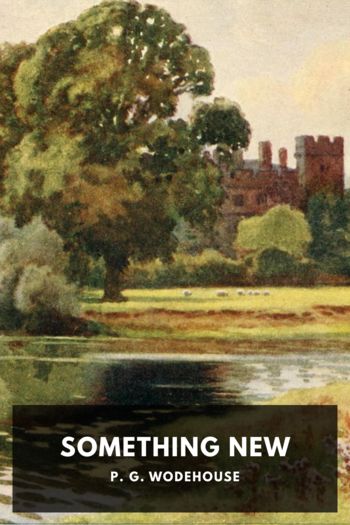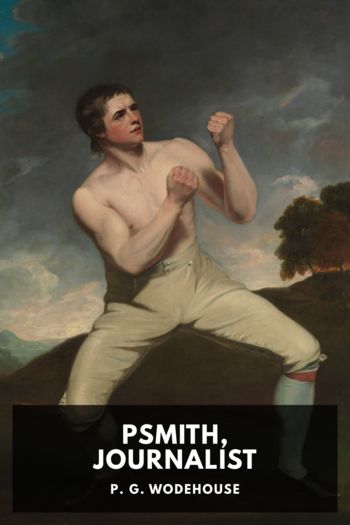Leave It to Psmith - P. G. Wodehouse (i wanna iguana read aloud .TXT) 📗

- Author: P. G. Wodehouse
Book online «Leave It to Psmith - P. G. Wodehouse (i wanna iguana read aloud .TXT) 📗». Author P. G. Wodehouse
“Hallo?” responded that lady agreeably.
“I … I …”
“What, I think, Miss Halliday is trying to say,” cut in Psmith, “is that she is finding it a little difficult to adjust her mind to the present development. I, too, must confess myself somewhat at a loss. I knew, of course, that Comrade Cootes had—shall I say an acquisitive streak in him, but you I had always supposed to be one hundred percent soul—and snowy white at that.”
“Yeah?” said Miss Peavey, but faintly interested.
“I imagined that you were a poetess.”
“So I am a poetess,” retorted Miss Peavey hotly. “Just you start in joshing my poems and see how quick I’ll bean you with a brick. Well, Ed, no sense in sticking around here. Let’s go.”
“We’ll have to tie these birds up,” said Mr. Cootes. “Otherwise we’ll have them squealing before I can make a getaway.”
“Ed,” said Miss Peavey with the scorn which her colleague so often excited in her, “try to remember sometimes that that thing balanced on your collar is a head, not a hubbard squash. And be careful what you’re doing with that gat! Waving it about like it was a bouquet or something. How are they going to squeal? They can’t say a thing without telling everyone they snitched the stuff first.”
“That’s right,” admitted Mr. Cootes.
“Well, then, don’t come butting in.”
The silence into which this rebuke plunged Mr. Cootes gave Psmith the opportunity to resume speech. An opportunity of which he was glad, for, while he had nothing of definitely vital import to say, he was optimist enough to feel that his only hope of recovering the necklace was to keep the conversation going on the chance of something turning up. Affable though his manner was, he had never lost sight of the fact that one leap would take him across the space of floor separating him from Mr. Cootes. At present, that small but effective revolver precluded anything in the nature of leaps, however short, but if in the near future anything occurred to divert his adversary’s vigilance even momentarily. … He pursued a policy of watchful waiting, and in the meantime started to talk again.
“If, before you go,” he said, “you can spare us a moment of your valuable time, I should be glad of a few words. And, first, may I say that I cordially agree with your condemnation of Comrade Cootes’s recent suggestion. The man is an ass.”
“Say!” cried Mr. Cootes, coming to life again, “that’ll be about all from you. If there wasn’t ladies present, I’d bust you one.”
“Ed,” said Miss Peavey with quiet authority, “shut your trap!”
Mr. Cootes subsided once more. Psmith gazed at him through his monocle, interested.
“Pardon me,” he said, “but—if it is not a rude question—are you two married?”
“Eh?”
“You seemed to me to talk to him like a wife. Am I addressing Mrs. Cootes?”
“You will be if you stick around a while.”
“A thousand congratulations to Comrade Cootes. Not quite so many to you, possibly, but fully that number of good wishes.” He moved towards the poetess with extended hand. “I am thinking of getting married myself shortly.”
“Keep those hands up,” said Mr. Cootes.
“Surely,” said Psmith reproachfully, “these conventions need not be observed among friends? You will find the only revolver I have ever possessed over there on the mantelpiece. Go and look at it.”
“Yes, and have you jumping on my back the moment I took my eyes off you!”
“There is a suspicious vein in your nature, Comrade Cootes,” sighed Psmith, “which I do not like to see. Fight against it.” He turned to Miss Peavey once more. “To resume a pleasanter topic, you will let me know where to send the plated fish-slice, won’t you?”
“Huh?” said the lady.
“I was hoping,” proceeded Psmith, “if you do not think it a liberty on the part of one who has known you but a short time, to be allowed to send you a small wedding-present in due season. And one of these days, perhaps, when I too am married, you and Comrade Cootes will come and visit us in our little home. You will receive a hearty, unaffected welcome. You must not be offended if, just before you say goodbye, we count the spoons.”
One would scarcely have supposed Miss Peavey a sensitive woman, yet at this remark an ominous frown clouded her white forehead. Her careless amiability seemed to wane. She raked Psmith with a glittering eye.
“You’re talking a dam’ lot,” she observed coldly.
“An old failing of mine,” said Psmith apologetically, “and one concerning which there have been numerous complaints. I see now that I have been boring you, and I hope that you will allow me to express. …”
He broke off abruptly, not because he had reached the end of his remarks, but because at this moment there came from above their heads a sudden sharp cracking sound, and almost simultaneously a shower of plaster fell from the ceiling, followed by the startling appearance of a long, shapely leg, which remained waggling in space. And from somewhere out of sight there filtered down a sharp and agonised oath.
Time and neglect had done their work with the flooring of the room in which Psmith had bestowed the Hon. Freddie Threepwood, and, creeping cautiously about in the dark, he had had the misfortune to go through.
But, as so often happens in this life, the misfortune of one is the good fortune of another. Badly as the accident had shaken Freddie, from the point of view of Psmith it was almost ideal. The sudden appearance of a human leg through the ceiling at a moment of nervous tension is enough to unman the stoutest-hearted, and Edward Cootes made no attempt to conceal his perturbation. Leaping a clear six inches from the floor, he jerked up his head and quite unintentionally pulled the trigger of his revolver. A bullet ripped through the plaster.
The leg disappeared. Not for an instant since he had been





Comments (0)